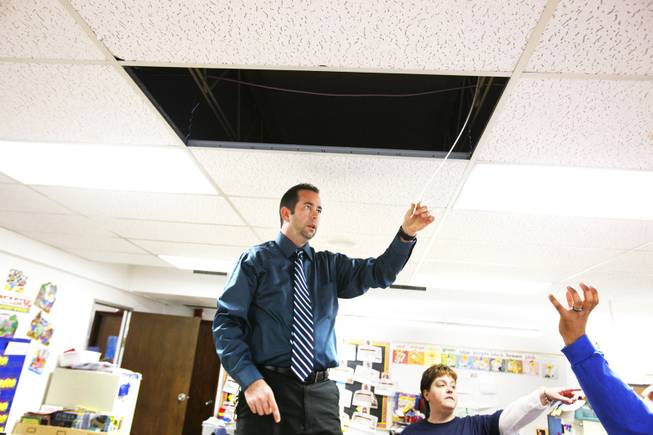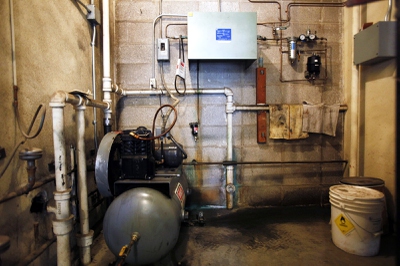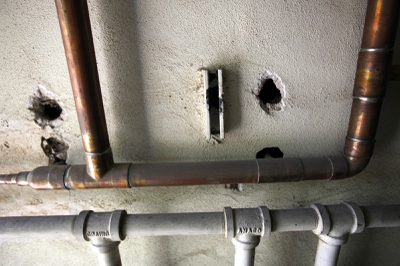
Principal Tim Adams of Rex Bell Elementary School checks out a roof leak on school grounds in Las Vegas Wednesday, Dec. 14, 2011.
Friday, Feb. 10, 2012 | 12:09 a.m.
Related story
Las Vegas residents may be voting this November on more than the next president of the United States. The Clark County School District is likely to seek public approval for a new capital campaign, which may raise property taxes as high as $74 a year on a $100,000 home.
The School District estimates it will need $5.3 billion to repair and modernize its school buildings over the next 10 years. Faced with multimillion-dollar budget cuts from the state, the district slashed its maintenance funding in recent years, delaying necessary repairs to school facilities.
Paint is peeling, roofs are leaking and air conditioning units are failing at many of the district’s 357 schools — now averaging 22 years old. Other schools lack the technology — computers, smart boards and other gadgets — to educate students for the jobs of the 21st century, officials say.
To rehabilitate old schools, the School Board is exploring several options that would allow the district to issue bonds to fund construction and maintenance of schools. The School Board heard the proposals — all of which require tax hikes — during its regular meeting Thursday night.
For the district to issue bonds, its revenues — mainly from property taxes — must exceed its debt on previous bond measures, which are still being repaid. But because of the depressed housing market, the district does not expect to have the bonding capacity for another six years — until 2018.
That may be too late for some of the district’s oldest and most dilapidated schools, said Jeff Weiler, the district’s chief financial officer. Without additional funding, “quite a number of schools” may have to close for safety reasons, he added.
“You’re really living on borrowed time,” Weiler told the somber-looking School Board.
Weiler proposed two options to fund a new capital campaign. All of the proposals must be approved by voters, the Clark County Debt Management Commission and a state oversight panel for school facilities.
• Option 1 would raise the current property tax rate from 55 cents to 77 cents, which equates to a tax hike of $74.20 per year on a $100,000 home. This would generate $550 million, boosting the district’s bonding capacity by 2014. The district would then go to the voters again for approval on a 10-year bond program, which would generate $5.1 billion in total capacity. Property taxes would remain increased for the duration of the program, until 2024.
• Option 2 would also raise the property tax rate by 22 cents, but allow a six-year capital levy, which would fund renovations on a pay-as-you-go system. This would generate $669 million in bonding capacity for the district by 2018, at which time the district would go to the voters again to approve a 10-year bond program, which would generate $4.7 billion in total capacity. The property tax rate would drop to the current rate of 55 cents after the six-year levy.
If a new capital bond program were approved, the majority of the money — about $3.4 billion — would go toward renovating and replacing old schools. About $1 billion would go to new technology and equipment for schools. The rest of the bond money would help build new schools in growing regions of the valley, and help the district strive for “educational equity” among its schools.
All seven School Board members supported the bonding options, but acknowledged that the district would need to gauge the public’s appetite for a tax increase amid record-high unemployment and foreclosures.
“Trying to ask taxpayers to pay more in this recession is a difficult thing to do,” School Board member John Cole said. “But we can’t do nothing.”
Cole favored seizing the low interest rate environment to issue bonds, before the economy picks up and the district ends up paying higher interest. “The longer we wait, the more it’ll cost us,” he said.
School Board member Chris Garvey was adamant she wouldn’t sit on her hands while schools continue to deteriorate. She advocated for a tax increase to help pay for school maintenance, saying, “I think I could shell out $75 a year.”
“We would be remiss as a board if we didn’t even ask our public what their input on that would be,” she said. “I can guarantee you that I would have a lot of parents angry at me if I told them their schools were going to be closed and I didn’t give them the option to tell me no.”
If the capital campaign is rejected by voters, the district may revert to year-round schools, said School Board member Carolyn Edwards. Last school year, the district went to a nine-month calendar to save $200 million in personnel costs. Any school closures may necessitate going back to a year-round school calendar to accommodate all students.
“When the air conditioning doesn’t work and it’s 110 degrees outside, we’ll probably have to close some schools,” Edwards said. “The rehabs make a huge difference to students and staff. The energy inside of these buildings changes and I think it makes a huge difference in student achievement.”
School Board President Linda Young initially suggested delaying any action until 2013, citing the tight four-month time frame in which to educate voters about the tax increase and bond program.
“I do see that we have to do something, but what we have to do is study this a bit more and be more in tune with the people in our community who are really suffering right now,” she said. “Anything like a property tax increase is devastating to some of these people, who just the thought of it sends them into a tailspin. I don’t know if the appetite is there at this time for a property tax rate increase.”
School Board member Erin Cranor suggested that officials bring the matter to a public meeting in March that would update voters on educational reform efforts in the district and gauge whether there is interest in a tax increase for school maintenance.
The School District must submit the ballot questions to the Clark County election department by June. The School Board directed its staff to first conduct research on the feasibility of a property tax increase, and then to form a committee that would conduct focus groups and research ways to target voters.
“It’s unrealistic to turn (the district around) on a dime when it’s cuts, cuts, cuts,” said School Board member Deanna Wright. “To become a world-class school district, we have to invest so we can run this district in a world-class way.”



Join the Discussion:
Check this out for a full explanation of our conversion to the LiveFyre commenting system and instructions on how to sign up for an account.
Full comments policy